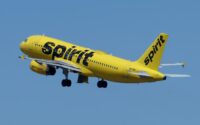United Airlines to buy 15 jets from Boom Supersonic
United Airlines said Thursday it will spend $3 billion to buy 15 supersonic, zero-emissions jetliners from aviation startup Boom Supersonic.
The jet maker says its “Overture” model jets will fly at double the speed of today’s fastest airliners, carrying up to 88 travelers each from New York to London in 3.5 hours and San Francisco to Tokyo in six hours. The planes will exclusively use jet fuel created from organic matter, making them the world’s first large commercial aircraft with net-zero carbon emissions.
The Overture would be the first commercial faster-than-sound jet to take flight since the Concorde flew from the 1970s until 2003. Concordes were retired amid declining demand for air travel after 9/11, as well as passenger complaints about noise, lack of cabin space and pricey tickets.
Scholl told the Post that his company plans to address the issues that plagued the Concorde, adding extra seating room and large windows. The cost of operating the Overture will also be 75 perent lower than the Concorde, translating into lower ticket prices for customers, he said.
“This is a much larger and more comfortable experience than Concorde,” Boom Supersonic CEO Blake Scholl told The Post. “It’s been half a century. We can do better.”

But Scholl’s company has a long way to go before it can deliver on United’s order, much less take over the transatlantic flight market. The company has yet to test any aircraft, with plans for a test flight of a one-seater aircraft sometime later this year or early in 2022, according to Scholl.
Denver-based Boom then plans to break ground on an Overture factory capable of manufacturing 66 jets per year in 2022, conduct its first full-sized test flights in 2026 and offer passenger flights through United and other airlines in 2029, he said.

However, the company’s schedule has been inconsistent. In 2019, Scholl told industry site AirlineRatings that the company’s first test jet would take to the air in 2020.
Asked about the delays, Scholl told the Post the company was operating with a “schedule of breathing room.”
“Safety is number-one, so you don’t want to create a pressurized schedule,” he said.
The United order includes a non-refundable deposit and an option to purchase 35 more jets for $7 billion if the airline likes the first batch, Scholl said. He would not disclose the size of the deposit.

The deal represents Boom’s first non-refundable deal. The company previously booked a refundable preorder from Virgin Airlines and signed a contract with the US Air Force to “explore an Overture configuration for government executive flight.” It also raised $10 million from Japan Airlines in 2017.
United can back out of the deal while losing its non-refundable deposit if Boom fails to receive regulatory approval or meet United’s safety, operating and sustainability requirements, the Chicago-based carrier said.

Boom has raised a total of $241 million in funding, according to Crunchbase, from investors including American Express ventures, Y Combinator, Emerson Collective and Caffeinated Capital.
Scholl said the company is “super well funded” but still plans to raise more money in the future.
For United Airlines, the deal represents an optimistic streak after the airline faced an existential crisis as passenger demand vanished during the coronavirus pandemic. The company posted a $7.7 billion loss in 2020, but demand for flights has started to bounce back.

United CEO Scott Kirby said, “Boom’s vision for the future of commercial aviation, combined with the industry’s most robust route network in the world, will give business and leisure travelers access to a stellar flight experience.”


